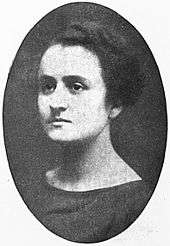Otilia Cazimir

Otilia Cazimir (pen name of Alexandra Gavrilescu; February 12, 1884 – June 8, 1967) was a Romanian poet and prose writer.
Biography
Origins and early work
Born in Cotu Vameș, Neamț County, she was the fifth child of schoolteachers Gheorghe Gavrilescu and his wife Ecaterina (née Petrovici).[1][2] She attended middle and high school in Iași and took courses at Iași University's literature and philosophy faculty, but did not graduate.[1] Her pen name, which she never liked, was selected by her mentors Mihail Sadoveanu and Garabet Ibrăileanu: the former came up with "Otilia", the latter with "Cazimir".[2][3][4] In 1912, she made her debut with poems in Viața Românească, to which she remained a loyal contributor. Other magazines that published her work include Însemnări ieșene, Adevărul literar și artistic, Lumea, Bilete de Papagal, Iașul nou, Iașul literar, Orizont, Gazeta literară and Cronica. Her first book was the 1923 poetry volume Lumini și umbre, followed by Fluturi de noapte (1926) and Cântec de comoară (1931).[1]
Cazimir's poems focus on the universe becoming domestic, while in its turn, the domestic perpetuates the cosmic.[3] Her prose books were Din întuneric. Fapte și întâmplări adevărate. Din carnetul unei doctorese (1928), Grădina cu amintiri și alte schițe (1929), În târgușorul dintre vii... (1939); she also authored a novel, A murit Luchi... (1942).[1] Some of these works include poetic sketches reminiscent of Antoine de Saint-Exupéry or Colette, while others are in a more realist vein. Cazimir worked as inspector-general of theaters in the Moldavia region from 1937 to 1947.[3] She was involved in a discreet, years-long relationship with the married poet George Topîrceanu.[2]
Communist period and legacy
Cazimir won the Romanian Academy's prize in 1927, the Femina Prize (1928), the national prize for poetry (1937) and the Romanian Writers' Society prize (1942).[1] She was a successful children's writer (Jucării, 1938; Baba Iarna intră-n sat, 1954), and published her memoirs as Prietenii mei scriitori... in 1960. Her poetry dated after 1944, when the Romanian Communist Party began its ascent to power, is often marked by prevailing socialist realist norms;[1] the communist regime awarded her the Order of Labor in 1954.[3]
Cazimir translated French literature (Guy de Maupassant) as well as Russian and Soviet (Maxim Gorky, Aleksandr Kuprin, Anton Chekhov, Konstantin Fedin. Arkady Gaidar). Finding her standard poems to be "typically feminine", Eugen Lovinescu labeled her as "gracious and minor".[1] She died in Iași;[1] her house there has been a museum since 1972, and includes the office where she wrote, portraits and local landscapes, her eyeglasses and inkwell, manuscripts and a library replete with signed books.[5]
-

Cazimir and George Topîrceanu
-
Cazimir's house in Iași
Notes
- 1 2 3 4 5 6 7 8 Aurel Sasu (ed.), Dicționarul biografic al literaturii române, vol. I, p. 289. Pitești: Editura Paralela 45, 2004. ISBN 973-697-758-7
- 1 2 3 (Romanian) Ramona Iacobuțe, "Tulburătoarea poveste de dragoste dintre Otilia Cazimir şi George Topîrceanu", Adevărul, January 30, 2015
- 1 2 3 4 Sanda Golopenția, "Otilia Cazimir", in Katharina M. Wilson (ed.), An Encyclopedia of Continental Women Writers, Vol. 1, p. 229-30. Taylor & Francis, 1991, ISBN 0-824-08547-7
- ↑ (Romanian) Simona Lazăr, "Otilia Cazimir şi 'diluviul lent de arome'", Jurnalul Național, February 12, 2013
- ↑ (Romanian) Muzeul "Otilia Cazimir", at the Iași Romanian Literature Museum site